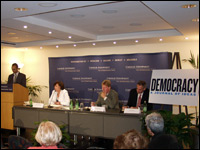Registration
You will receive an email confirming your registration.
IMGXYZ765IMGZYXOn September 17, Democracy: A Journal of Ideas and the Carnegie Endowment for International Peace hosted a discussion on the U.S. Strategy in the Middle East after the troops come home.
General Petraeus' report to Congress and the current discussion about Iraq are focused on how many troops are deployed there, how effective they are, and when they're coming home. But what's missing from the popular debate is a discussion of what comes next. Once there is a significant drawdown of U.S. forces in Iraq, what should American strategy be in the Middle East?
In its fall issue released on September 10, Democracy: A Journal of Ideas brought together an unprecedented collection of thirteen of the top progressive foreign policy thinkers writing on the critical topic: "What the U.S. should do once it leaves Iraq." Three of the authors discussed the future of American foreign policy in the Middle East:
Jessica Tuchman Mathews, president of the Carnegie Endowment for International Peace.
Will Marshall, president of the Progressive Policy Institute and editor of With All Our Might: A Progressive Strategy for Defeating Jihadism and Defending Liberty.
Ray Takeyh, senior fellow at the Council on Foreign Relations and author of Hidden Iran: Paradox and Power in the Islamic Republic.
Kenneth Baer, co-editor of Democracy: A Journal of Ideas, moderated the panel.
About Democracy: A Journal of Ideas
Democracy: A Journal of Ideas is a quarterly journal of progressive thought founded by Kenneth Baer and Andrei Cherny that serves as a place where ideas can be developed and important debates can be spurred. Democracy is the progressive analogue of conservative journals such as Commentary, the Public Interest, and the National Interest, which have been the source of transformative conservative ideas. It is at the forefront of forging a 21st century progressivism that responds to a new economy, new national security threats, and the new contours of American life. Democracy is sold in bookstores in every state, and its readers - in print and at http://www.democracyjournal.org/ - can be found in 90 countries around the world.
About the Carnegie Endowment for International Peace
The Carnegie Endowment for International Peace is a private, nonprofit organization dedicated to advancing cooperation between nations and promoting active international engagement by the United States. Founded in 1910, its work is nonpartisan and dedicated to achieving practical results. In 2007, the Endowment embarked on the first phase of its transformation into the first global think tank, adding operations in Beijing, Beirut, and Brussels to its longstanding offices in Washington and Moscow. These five locations include the centers of world governance and the three places whose political evolution and international policies will most determine the near-term possibilities for international peace and economic advance. www.CarnegieEndowment.org
